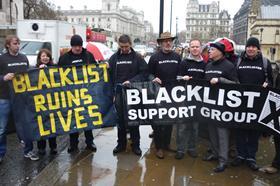Judge rules tribunal appeal by blacklisted worker Dave Smith should be heard by High Court judge

A legal case against Carillion mounted by blacklist campaigner and electrician Dave Smith will be subject to a full two-day hearing in front of a High Court judge.
At a preliminary hearing at the Employment Appeal Tribunal off London’s Fleet Street yesterday, the Hon Mr Justice Singh granted lawyers acting on Smith’s behalf the right to have their case - which is based on the Human Rights Act - heard, noting that it could have a legal importance “going well beyond this case or even blacklisting”.
Smith claims he was repeatedly dismissed and refused work once his name appeared on The Consulting Association (TCA) blacklist after he had raised concerns about asbestos, poor toilet facilities and contaminated waste on London and Essex building sites controlled by companies in the Carillion group.
However, he lost his original employment tribunal in January last year because he was not directly employed by these companies, including John Mowlem Construction, but via an employment agency.
Smith worked on Mowlem jobs on the Docklands Light Railway in the late 1990s and on the reconstruction of the former Co-op store in Stratford in late 2000.
John Hendy QC, acting for Smith, argued that the tribunal decision is in violation of the Human Rights Act and the European Convention on Human Rights - Article 8 (the right to privacy) and Article 11 (the right to freedom of association) and that these pieces of legislation should apply to all “workers” and not just direct employees.
He said: “Mr Smith was blacklisted, maligned and had his employment terminated by Mowlem.
“It would be extraordinary if English law…could not provide a remedy to Mr Smith.”
Hendy added the tribunal had “assumed” that because Smith was employed through an agency that there could not also be a contract between him and “end user” Mowlem.
“We propose that this is untenable without further investigation,” he said.
Judge Singh, a specialist in Human Rights law and a High Court judge of the Queen’s Bench division, said that the case should now proceed to a full hearing and said the potential implications regarding the Human Rights Act meant it should be heard by a High Court judge rather than by another employment tribunal.
He added that the case may be heard by him or another judge.
A spokesperson for Carillion said: “Carillion was not permitted to appear on the appeal hearing today as that was purely for Mr Smith and his lawyers, but Carillion will of course be represented at the full hearing of this appeal in due course.
“Carillion believes the original decision was legally correct, and is fully prepared to defend that tribunal decision at Mr Smith’s appeal.
“Carillion also reiterates that while it does not acknowledge any liability to Mr Smith whatsoever, as Mr Smith was never an employee of Carillion or any of its associated companies, and the issues about which Mr Smith claims relate to 1998/99. Carillion does not engage in or condone blacklisting and has been totally open about its past use of referencing services through a subsidiary Crown House, which ended years before blacklisting was made illegal.”


























No comments yet